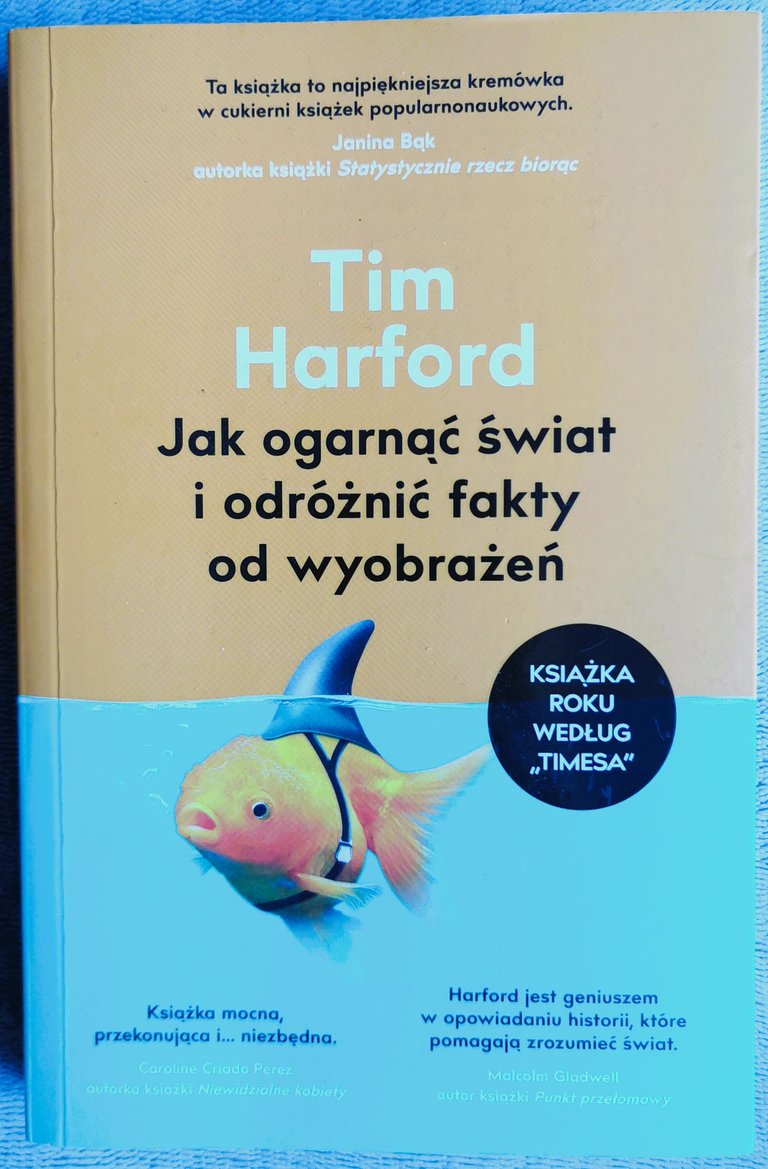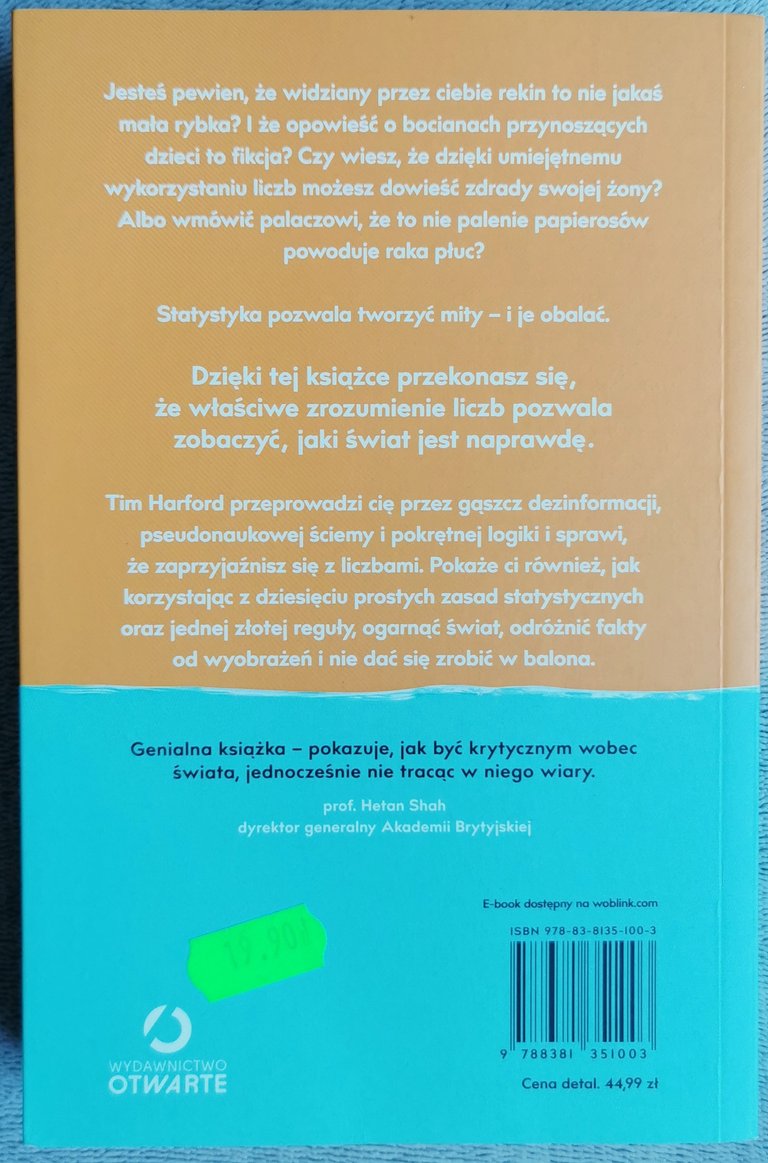[PL/EN] Czytaj z Marcinem 15/2024 - "Jak ogarnąć świat i odróżnić fakty od wyobrażeń" ('How To Make the World Add Up'), Tim Hartford

| Po książkę Tima Harforda sięgnąłem w znacznym stopniu dzięki bardzo entuzjastycznej opinii Janiny Bąk, której książki czytałem (i opisywałem) z dużą przyjemnością już wcześniej. Założyłem bowiem, że jeśli ceniona przeze mnie autorka tak bardzo coś poleca, to prawdopodobnie będzie to warte mojej uwagi. I zasadniczo się nie pomyliłem. |
I picked up Tim Harford's book in large part thanks to a very enthusiastic review by Janina Bąk, whose books I had previously read (and reviewed) with great pleasure. I assumed that if an author I admired so much recommended something, it was probably worth my attention. And in the main I was not wrong. |
| Harford porusza kwestie nie tylko interesujące, ale też i bardzo w dzisiejszych czasach ważne. Pokazuje nam, jak wielką rolę we współczesnym świecie odgrywa statystyka i ostrzega, że ta wielka rola może być zarówno pożyteczna, jak i bardzo szkodliwa. Zwraca uwagę na to, jak wiele zależy od tego, czy badania zostały przeprowadzone w sposób właściwy, a także od tego, czy osoby korzystające z wyników potrafią te wyniki właściwie zinterpretować. A następnie – czy użyją ich w dobrych intencjach, czy w celu manipulacji społeczeństwem? |
Harford raises issues that are not only interesting but also very relevant today. He shows us how big a role statistics plays in the modern world, and warns us that this big role can be both useful and very harmful. He points out how much depends on whether the research has been done properly and whether those who use the results are able to interpret them correctly. And then - will they use it with good intentions or to manipulate the public? |
| Autor pokazuje nam, na co w zetknięciu z wszelkiego rodzaju danymi statystycznymi zwracać uwagę, by maksymalnie zmniejszyć prawdopodobieństwo poddania się takiej manipulacji. Wskazuje, że powinniśmy starać się podchodzić do nich maksymalnie bezstronnie, unikając osobistych uprzedzeń, upewniać się, czy rzeczywiście dobrze rozumiemy, co konkretne dane przedstawiają, co pomijają, w jaki sposób zostały zebrane i przez kogo. No i oczywiście – że powinniśmy być gotowi do zmiany swoich poglądów, jeśli staniemy w obliczu nowych, nieznanych nam wcześniej faktów. |
The author shows us what to look out for when dealing with any kind of statistical data in order to minimise the likelihood of being subject to such manipulation. He suggests that we should try to approach them as objectively as possible, avoiding personal bias, making sure that we really understand what particular data represent, what they leave out, how they were collected and by whom. And, of course, that we should be prepared to change our minds when confronted with new, previously unknown facts. |
| Wszystko to jest ilustrowane różnymi interesującymi, czasami wręcz wprawiającymi w osłupienie, przykładami. O tym, jak znakomitemu ekspertowi, Abrahamowi Brediusowi zdołano wmówić, że pokazany mu marny obraz jest nieznanym wcześniej dziełem Vermeera. O tym, w jaki sposób udało się w Wielkiej Brytanii skrócić okres czekania na wizytę lekarską umówioną przez telefon (i dlaczego pacjenci wcale nie byli z tego zadowoleni). O tym, że pozornie wiarygodne eksperymenty psychologiczne często okazują się wątpliwe, gdy ktoś zaryzykuje ich powtórzenie. O tym, jak Big Data radziło sobie z przewidywaniem epidemii grypy i czy rzeczywiście sobie radziło. I wiele, wiele innych interesujących historii. Brzmi super? |
All this is illustrated with a variety of interesting, sometimes startling, examples. We learn how the eminent expert Abraham Bredius was persuaded that the flimsy painting shown to him was a hitherto unknown work by Vermeer. How waiting times for telephone medical appointments were reduced in Britain (and why patients were not happy about it). How seemingly plausible psychological experiments often turn out to be questionable when someone risks repeating them. How big data could have predicted flu epidemics, and whether it actually did. And many, many more interesting stories. Sound great? |
| I tu właśnie wkracza to „zasadniczo” z pierwszego akapitu. Zasadniczo – brzmi. Ale… po pierwsze primo – kwestia języka. Nie wiem, czy w danym przypadku to kwestia autora, czy tłumacza, ale język nie porywa. Nie czułem się porwany lekturą tak, jak to miało miejsce choćby w przypadku książek Janiny. Treść – owszem, tak, jak najbardziej, ale sposób docierania do niej był dość męczący, brakowało tej lekkości ułatwiającej przyswajanie wiedzy. Oczywiście, biorąc pod uwagę opinie przedstawione na okładce, dopuszczam możliwość, że to ja mam tutaj jakiś nietypowy problem z odbiorem, ale wrażenie mam takie, a nie inne… I bardzo możliwe, że z nim się wiąże wrażenie drugie – że taki, a nie inny styl może nie tylko utrudnić przyswajanie treści, ale wręcz zniechęcić do bliższego kontaktu ze statystyką i przyjęcia prostego wniosku, że skoro za jej pomocą można manipulować i potwierdzać nieprawdę, to nie ma sensu się danymi statystycznymi interesować w ogóle, że szkoda na to czasu i nerwów. A to już byłoby zupełnie sprzeczne z celami i motywacjami autora… |
And this is where the 'in the main' from the first paragraph comes in. Essentially - it does. But... first of all - the question of language. I don't know if it's the author or the translator, but the language doesn't carry you away. I didn't feel gripped by the reading as I did with Janina's books, for example. The content, yes, but the way it was presented was rather tiresome, lacking that lightness that makes it easier to absorb knowledge. Of course, given the opinions expressed on the cover, I allow for the possibility that it is I who have an atypical reception problem here, but I have this impression and not another... And it is quite possible that the second impression is related to this - that this style, and not another, may not only hinder the assimilation of the content, but may even discourage closer contact with statistics and the adoption of the simple conclusion that, since it can be used to manipulate and confirm untruths, there is no point in being interested in statistics at all, that it is a waste of time and nerves. That would be completely at odds with the author's aims and motivations. .... |
| Wszystko to sprawia, że ponownie mam dylemat, jak powinienem ocenić książkę jako całość. Jeśli miałbym ocenić wyłącznie treść – prawdopodobnie byłoby to 8/10. Jeśli sam styl i przyjemność czytania – to wątpię, że dałbym więcej, niż 5,5/10, przy maksimum dobrej woli – 6. Ostatecznie chyba jednak zdecyduję się na 7/10 z lekkim poczuciem, że być może nieco zawyżyłem. Ale jednak na ogół, a w przypadku książek naukowych – prawie zawsze, to treść jest najważniejsza, więc niech ona zadecyduje w większym stopniu. I mimo wszystko powiem, że polecam, nawet jeśli przebrnięcie przez nią będzie wymagać trochę więcej wysiłku. |
All this leaves me in a dilemma as to how to rate the book as a whole. If I were to rate it on content alone - it would probably be 8/10. If it were style and enjoyment alone - I doubt I would give more than 5.5/10, with a maximum of goodwill - 6. In the end, however, I think I will probably go for 7/10, with a slight feeling that I may have exaggerated a little. But still, in general, and in the case of science books almost always, it is the content that is most important, so let that decide the big picture. And yet I would say that I recommend it, even if it does take a bit more effort to get through. |

0
0
0.000
Hello avtandil!
It's nice to let you know that your article will take 15th place.
Your post is among 15 Best articles voted 7 days ago by the @hive-lu | King Lucoin Curator by szejq
You receive 🎖 0.1 unique LUBEST tokens as a reward. You can support Lu world and your curator, then he and you will receive 10x more of the winning token. There is a buyout offer waiting for him on the stock exchange. All you need to do is reblog Daily Report 418 with your winnings.
Buy Lu on the Hive-Engine exchange | World of Lu created by szejq
STOPor to resume write a wordSTART